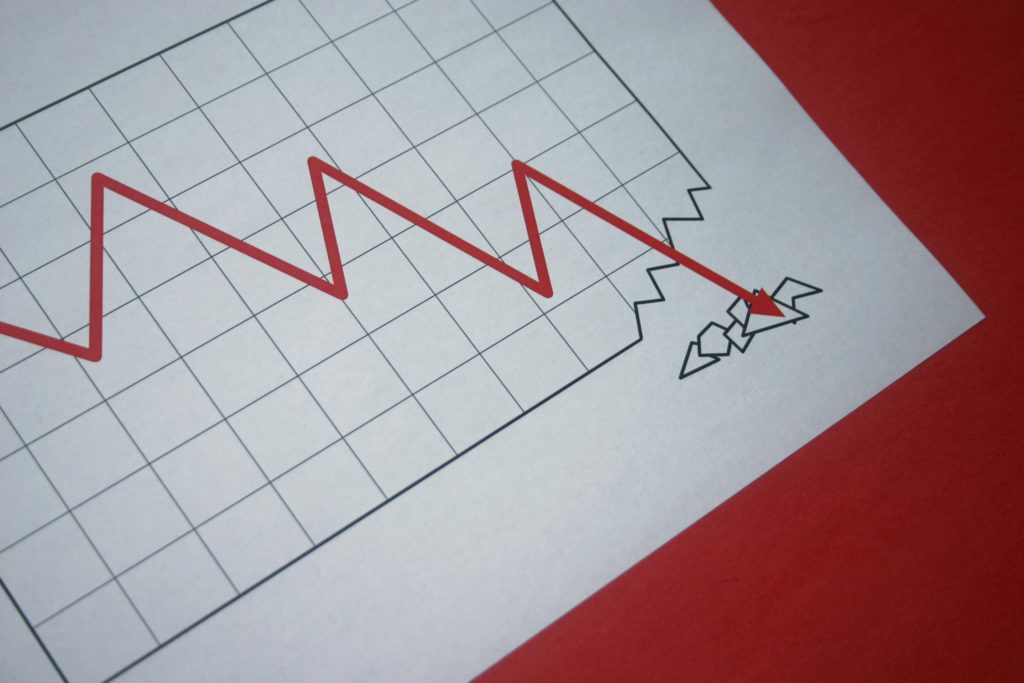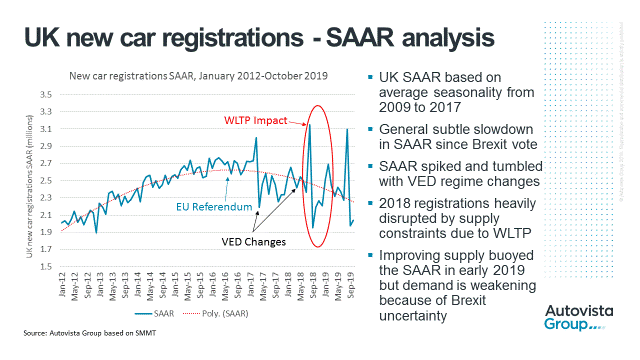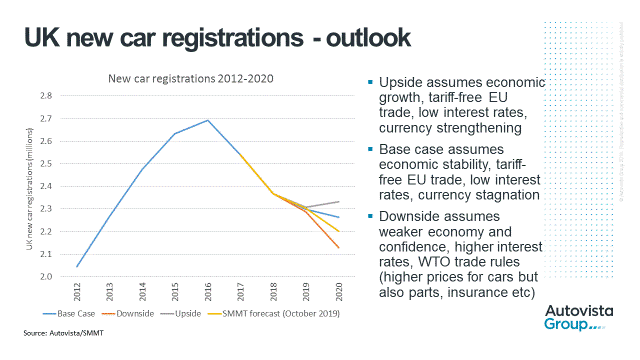UK new car registrations tumbled 6.7% in October
05 November 2019

5 November 2019
New car registrations in the UK fell by 6.7% year-on-year in October, according to the latest data released today by the Society of Motor Manufacturers and Traders (SMMT). This downturn in demand is despite a 2.9% year-on-year decline in demand in October 2018 as the new WLTP emissions continued to disrupt supply.
In volume terms, 10,348 fewer cars were registered than in October last year, ′reflecting a tough environment for businesses and consumers as economic and political uncertainty continued to impact confidence’ according to the SMMT statement.
Mike Hawes, SMMT Chief Executive, said, ′The overall market remains tough, however, with October now the year’s eighth month of decline and in need of an injection of confidence. Whether the general election delivers a ′bounce’ to the economy remains to be seen’
On a slightly positive note, Autovista Group has calculated that the seasonally-adjusted annualised rate (SAAR) did improve slightly in October, compared to September, to back above two million registrations.
 Record sales of alternatively-fuelled vehicles
The decline in October was driven by falling demand from private consumers, with registrations down 13.2%. Business demand also fell although fleet registrations were stable.
Registrations of new diesel cars fell for the 31st consecutive month, down 28.3%, and even demand for petrol cars declined, by 3.2%. However, electrified cars continue to grow in popularity. Registrations of hybrid electric cars (HEVs) increased by 28.9% in October, with 7,950 leaving showrooms, and demand for battery electric vehicles (BEVs) surged by 151.8% to 3,162 units. Plug-in hybrids (PHEVs) fell just short of their performance in October 2018, down 1.7%. Combined, registrations of alternatively-fuelled vehicles gained a 9.9% market share in October, up from 6.9% in October 2018, and the highest monthly share on record.
′The growth in alternatively fuelled cars is very welcome, showing increasing buyer appetite for these new technologies,’ Hawes said. ′With attractive deals and an ever-greater choice of low, ultra-low and zero emission models arriving in the UK’s showrooms, consumers have every incentive to consider buying a new car,’ he added.
In the year-to-date, the new car market is down 2.9% compared to the first 10 months of 2018. The SMMT commented that ′the fall reflects continued uncertainty over diesel and clean air zones, stunted economic growth and uncertainty over Brexit.’
PHEV registrations were 26.7% lower than in the first ten months of 2018. However, HEVs and BEVs were up 16.5% and 125.1% respectively, compared to the same period last year.
Brexit extension impacts the outlook
Despite declines in new car registrations in November and December 2018 compared to 2017, due to ongoing disruption to supply as a result of the implementation of WLTP, demand is expected to be weaker in each month in 2019.
The October result was exactly in line with Autovista Group’s forecast for the month and so we still predict that 2019 will finish 2.9% down on 2018 in our baseline forecast. However, the Brexit extension to 31 January and the general election, called for 12 December, means uncertainty will continue into 2020.
Accordingly, the forecast for 2020 has been revised downward and we now expect a 1.5% decline in new car registrations. If the UK leaves the EU without a deal, the impact is expected to be more severe and the downside forecast calls for a 7.0% drop in 2020. If Brexit is cancelled entirely, modest growth of 1.0% is anticipated.
Record sales of alternatively-fuelled vehicles
The decline in October was driven by falling demand from private consumers, with registrations down 13.2%. Business demand also fell although fleet registrations were stable.
Registrations of new diesel cars fell for the 31st consecutive month, down 28.3%, and even demand for petrol cars declined, by 3.2%. However, electrified cars continue to grow in popularity. Registrations of hybrid electric cars (HEVs) increased by 28.9% in October, with 7,950 leaving showrooms, and demand for battery electric vehicles (BEVs) surged by 151.8% to 3,162 units. Plug-in hybrids (PHEVs) fell just short of their performance in October 2018, down 1.7%. Combined, registrations of alternatively-fuelled vehicles gained a 9.9% market share in October, up from 6.9% in October 2018, and the highest monthly share on record.
′The growth in alternatively fuelled cars is very welcome, showing increasing buyer appetite for these new technologies,’ Hawes said. ′With attractive deals and an ever-greater choice of low, ultra-low and zero emission models arriving in the UK’s showrooms, consumers have every incentive to consider buying a new car,’ he added.
In the year-to-date, the new car market is down 2.9% compared to the first 10 months of 2018. The SMMT commented that ′the fall reflects continued uncertainty over diesel and clean air zones, stunted economic growth and uncertainty over Brexit.’
PHEV registrations were 26.7% lower than in the first ten months of 2018. However, HEVs and BEVs were up 16.5% and 125.1% respectively, compared to the same period last year.
Brexit extension impacts the outlook
Despite declines in new car registrations in November and December 2018 compared to 2017, due to ongoing disruption to supply as a result of the implementation of WLTP, demand is expected to be weaker in each month in 2019.
The October result was exactly in line with Autovista Group’s forecast for the month and so we still predict that 2019 will finish 2.9% down on 2018 in our baseline forecast. However, the Brexit extension to 31 January and the general election, called for 12 December, means uncertainty will continue into 2020.
Accordingly, the forecast for 2020 has been revised downward and we now expect a 1.5% decline in new car registrations. If the UK leaves the EU without a deal, the impact is expected to be more severe and the downside forecast calls for a 7.0% drop in 2020. If Brexit is cancelled entirely, modest growth of 1.0% is anticipated.

 Record sales of alternatively-fuelled vehicles
The decline in October was driven by falling demand from private consumers, with registrations down 13.2%. Business demand also fell although fleet registrations were stable.
Registrations of new diesel cars fell for the 31st consecutive month, down 28.3%, and even demand for petrol cars declined, by 3.2%. However, electrified cars continue to grow in popularity. Registrations of hybrid electric cars (HEVs) increased by 28.9% in October, with 7,950 leaving showrooms, and demand for battery electric vehicles (BEVs) surged by 151.8% to 3,162 units. Plug-in hybrids (PHEVs) fell just short of their performance in October 2018, down 1.7%. Combined, registrations of alternatively-fuelled vehicles gained a 9.9% market share in October, up from 6.9% in October 2018, and the highest monthly share on record.
′The growth in alternatively fuelled cars is very welcome, showing increasing buyer appetite for these new technologies,’ Hawes said. ′With attractive deals and an ever-greater choice of low, ultra-low and zero emission models arriving in the UK’s showrooms, consumers have every incentive to consider buying a new car,’ he added.
In the year-to-date, the new car market is down 2.9% compared to the first 10 months of 2018. The SMMT commented that ′the fall reflects continued uncertainty over diesel and clean air zones, stunted economic growth and uncertainty over Brexit.’
PHEV registrations were 26.7% lower than in the first ten months of 2018. However, HEVs and BEVs were up 16.5% and 125.1% respectively, compared to the same period last year.
Brexit extension impacts the outlook
Despite declines in new car registrations in November and December 2018 compared to 2017, due to ongoing disruption to supply as a result of the implementation of WLTP, demand is expected to be weaker in each month in 2019.
The October result was exactly in line with Autovista Group’s forecast for the month and so we still predict that 2019 will finish 2.9% down on 2018 in our baseline forecast. However, the Brexit extension to 31 January and the general election, called for 12 December, means uncertainty will continue into 2020.
Accordingly, the forecast for 2020 has been revised downward and we now expect a 1.5% decline in new car registrations. If the UK leaves the EU without a deal, the impact is expected to be more severe and the downside forecast calls for a 7.0% drop in 2020. If Brexit is cancelled entirely, modest growth of 1.0% is anticipated.
Record sales of alternatively-fuelled vehicles
The decline in October was driven by falling demand from private consumers, with registrations down 13.2%. Business demand also fell although fleet registrations were stable.
Registrations of new diesel cars fell for the 31st consecutive month, down 28.3%, and even demand for petrol cars declined, by 3.2%. However, electrified cars continue to grow in popularity. Registrations of hybrid electric cars (HEVs) increased by 28.9% in October, with 7,950 leaving showrooms, and demand for battery electric vehicles (BEVs) surged by 151.8% to 3,162 units. Plug-in hybrids (PHEVs) fell just short of their performance in October 2018, down 1.7%. Combined, registrations of alternatively-fuelled vehicles gained a 9.9% market share in October, up from 6.9% in October 2018, and the highest monthly share on record.
′The growth in alternatively fuelled cars is very welcome, showing increasing buyer appetite for these new technologies,’ Hawes said. ′With attractive deals and an ever-greater choice of low, ultra-low and zero emission models arriving in the UK’s showrooms, consumers have every incentive to consider buying a new car,’ he added.
In the year-to-date, the new car market is down 2.9% compared to the first 10 months of 2018. The SMMT commented that ′the fall reflects continued uncertainty over diesel and clean air zones, stunted economic growth and uncertainty over Brexit.’
PHEV registrations were 26.7% lower than in the first ten months of 2018. However, HEVs and BEVs were up 16.5% and 125.1% respectively, compared to the same period last year.
Brexit extension impacts the outlook
Despite declines in new car registrations in November and December 2018 compared to 2017, due to ongoing disruption to supply as a result of the implementation of WLTP, demand is expected to be weaker in each month in 2019.
The October result was exactly in line with Autovista Group’s forecast for the month and so we still predict that 2019 will finish 2.9% down on 2018 in our baseline forecast. However, the Brexit extension to 31 January and the general election, called for 12 December, means uncertainty will continue into 2020.
Accordingly, the forecast for 2020 has been revised downward and we now expect a 1.5% decline in new car registrations. If the UK leaves the EU without a deal, the impact is expected to be more severe and the downside forecast calls for a 7.0% drop in 2020. If Brexit is cancelled entirely, modest growth of 1.0% is anticipated.
